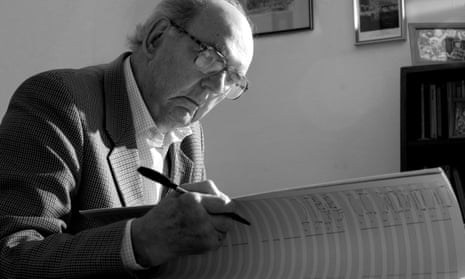In the years following the composer John Joubert’s arrival in Britain from South Africa, he produced such staples of the Anglican choral repertoire as the carols Torches (1951) and There is No Rose of Such Virtue (1954), and the anthem O Lorde, the Maker of Al Thing (1952).
But he did not forget his roots, whether in his abortive operatic project based on Alan Paton’s Cry, The Beloved Country; his powerful single-movement Symphony No 2 (1970), inscribed to the memory of the victims of the Sharpeville massacre of a decade earlier; or the suite South of the Line (1985), where he set five anti-Boer war poems by Thomas Hardy for chorus and percussion.
In his orchestral fantasia Déploration (1978), marking the death of Benjamin Britten two years earlier, he commemorated a composer similarly taken up with war and cruelty, with the Last Post hauntingly stalking the closing pages.
Joubert, who has died aged 91, once commented: “I’ve never really wanted to be pigeonholed as a composer. I’ve always wanted to write anything that I was either asked to, or wanted to write.”
With nearly 200 works to his credit, covering every genre, his catalogue was far from limited, with oratorios – including Wings of Faith (2003), An English Requiem (for the 2010 Three Choirs festival) and St Mark Passion (2016) – songs, and song cycles. Instrumental works included organ music, three symphonies, a sinfonietta and five concertos (one apiece for violin, piano, bassoon, cello and oboe).
He also produced other orchestral works, four string quartets, a string trio, piano trio, octet and three piano sonatas, recorded by his friend John McCabe. Every composition was impeccably crafted and easily assimilated by virtue of his expert writing for voices or instruments.
There were also eight operas, or nine counting the two distinct versions of his last, Jane Eyre. Composed in 1987-97 in three acts, it was recast in 2014-15, with much of the discarded music reworked as his Symphony No 3, completed in 2017.

Of the more than 80 recordings devoted to Joubert, or featuring at least one of his works, the most celebrated is of the revised opera premiere in Birmingham in October 2016. It features April Fredrick as Jane and the English Symphony Orchestra conducted by Kenneth Woods.
Joubert’s third opera, Silas Marner, based on the novel by George Eliot, was intended to form part of the 50th anniversary celebrations in 1960 for the Union of South Africa. After the festival organisers found it to be unsuitable – presumably because of its subject matter – it was mounted at the University of Cape Town and hailed by the press as the first full-length opera by a South African composer. But although Joubert is the most distinguished classical composer to have come out of the country, he took British citizenship when he left after this first return visit.
Born in Cape Town, John had Huguenot ancestry on the side of his father, a clerk, and Dutch on his mother’s side. She had studied the piano with Harriet Cohen in London. His own outlook was English by virtue of his education, at the Anglican Diocesan college, Bishops, in Cape Town, run on English public school lines.
While still a schoolboy he studied at the South African College of Music, part of the University of Cape Town, with its retired principal WH Bell, a pupil in Britain of Frederick Corder, who also taught Arnold Bax and Granville Bantock. Joubert graduated from both school and the SACM in 1944, and continued to study with Bell privately, having flirted with the idea of becoming a writer or an artist.
The Cape Town municipal orchestra played some of his earliest compositions, and in 1946 he was given a Performing Rights Society scholarship to the Royal Academy of Music in London. There his teachers included Alan Bush, Howard Ferguson and Theodore Holland.
In 1950 he graduated with a BMus from Durham University, started lecturing at Hull and had his First String Quartet published by Novello, which remained his principal publishers. In 1962 he moved to Birmingham University as a senior lecturer, later reader, in music, retiring in 1986 to devote himself to composition. He was appointed visiting professor at the University of Otago in New Zealand (1979), and was composer-in-residence at the Peterborough Cathedral (1990) and Presteigne (1997) festivals.
In 1951 he married Mary Litherland, having met her as a piano student at the Royal Academy. She became a music teacher, and Torches, based on a Galician carol, was written for her pupils.
She survives him along with their daughter, Anna, a cellist, son, Pierre, a violinist, and four grandchildren, Matthew, John, Naomi and Alexander.

Comments (…)
Sign in or create your Guardian account to join the discussion